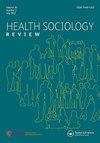粮食不安全、心理困扰和酗酒:了解家庭在性别差异中的突出作用
IF 2.5
2区 医学
Q2 HEALTH POLICY & SERVICES
引用次数: 9
摘要
摘要本文的目的是通过评估具有全国代表性的美国成年人样本中性别差异在家庭角色和安排中的解释作用,扩大记录粮食不安全对心理健康不利影响的研究。利用2011-2012年和2013-2014年国家健康和营养检查调查(NHANES)周期的数据,我们估计了一系列模型,使用成人食物不安全措施和自我报告的性别作为抑郁症状和饮酒的主要预测因素。我们的研究结果表明,婚姻对女性和男性更严重的抑郁症状以及男性更高的饮酒量具有保护作用。然而,在男性粮食不安全的情况下,婚姻对酗酒的保护作用有所减弱。此外,研究结果表明,为人父母对女性更大的抑郁症状和饮酒有保护作用,但对男性没有。然而,在粮食不安全的家庭中,生孩子的保护作用正在减弱。这些发现为越来越多的关于家庭粮食不安全对心理健康影响的文献增添了内容,并通过澄清家庭角色对粮食不安全与心理和行为结果之间的性别差异的影响,扩展了这项工作。本文章由计算机程序翻译,如有差异,请以英文原文为准。
Food insecurity, psychological distress and alcohol use: understanding the salience of family roles for gender disparities
ABSTRACT The goal of this paper was to expand upon research documenting the adverse mental health effects of food insecurity by assessing the explanatory role of gender differences in family roles and arrangements among a nationally-representative sample of U.S. adults. Using data from the combined 2011–2012 and 2013–2014 cycles of The National Health and Nutrition Examination Survey (NHANES), we estimated a series of models using adult food insecurity measures and self-reported gender as main predictors of depressive symptoms and alcohol use. Our results demonstrate that marriage is protective against greater depressive symptomatology among women and men, and higher alcohol consumption among men. However, the protective effects of marriage against high alcohol use are reduced within the context of food insecurity among men. Further, the results indicate that parenthood is protective against greater depressive symptoms and alcohol consumption among women, but not men. The protective effects of having children are, however, diminished among women in food insecure households. These findings add to the growing literature on the mental health consequences of household food insecurity, and extend this work by clarifying ways in which family roles come to bear on gender differences in the association between food insecurity and psychological and behavioural outcomes.
求助全文
通过发布文献求助,成功后即可免费获取论文全文。
去求助
来源期刊

Health Sociology Review
Multiple-
CiteScore
7.50
自引率
0.00%
发文量
14
期刊介绍:
An international, scholarly peer-reviewed journal, Health Sociology Review explores the contribution of sociology and sociological research methods to understanding health and illness; to health policy, promotion and practice; and to equity, social justice, social policy and social work. Health Sociology Review is published in association with The Australian Sociological Association (TASA) under the editorship of Eileen Willis. Health Sociology Review publishes original theoretical and research articles, literature reviews, special issues, symposia, commentaries and book reviews.
 求助内容:
求助内容: 应助结果提醒方式:
应助结果提醒方式:


